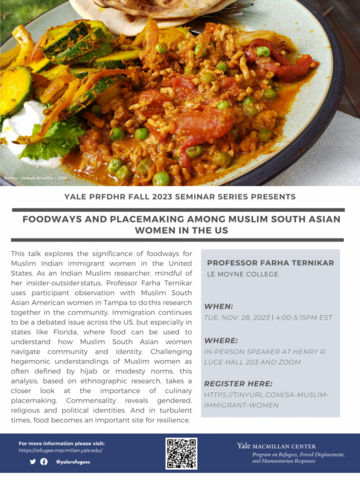
This talk by Professor Farha Ternikar explores the significance of foodways for Muslim Indian immigrant women in the United States. As an Indian Muslim researcher, mindful of her insider-outsider status, she uses participant observation with Muslim South Asian American women in Tampa to do this research together in the community. Immigration continues to be a debated issue across the US, but especially in states like Florida, where food can be used to understand how Muslim South Asian women navigate community and identity. Challenging hegemonic understandings of Muslim women as often defined by hijab or modesty norms, this analysis, based on ongoing ethnographic research, takes a closer look at the importance of culinary placemaking. Commensality reveals important gendered, religious and political identities. And in turbulent times, food becomes an important site for resilience.
Dr. Farha Ternikar is Professor of Sociology and Director of Gender, Women and Sexuality Studies at Le Moyne College. Her most recent book, Intersectionality and Muslim Women: Beyond Hijab and Halal (2021), explores how food, fashion, and media are important modes of analysis for studying Muslim-American women. She is currently a visiting scholar at Chatham University, where she is working on a new manuscript using a transnational feminist framework in conversation with intersectional feminism to examine immigrant foodways. Dr. Ternikar is also working on a co-edited volume with Stephanie Y. Evans which brings together over a dozen female scholars of color who work on food. She has authored several articles on gender, race and religious identity in the Journal of Ethnic Studies, International Journal of Contemporary Sociology, and Sociology Compass.